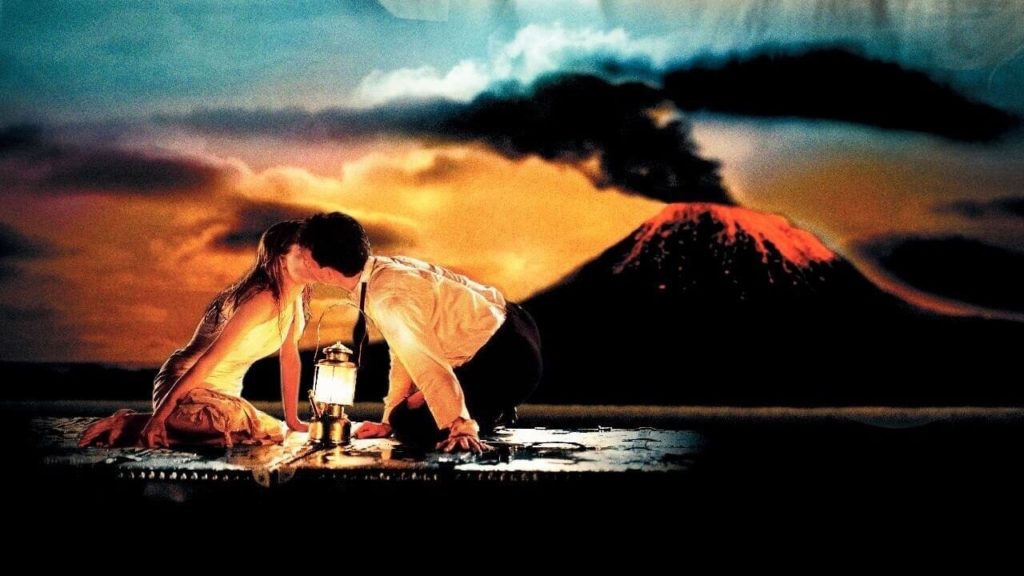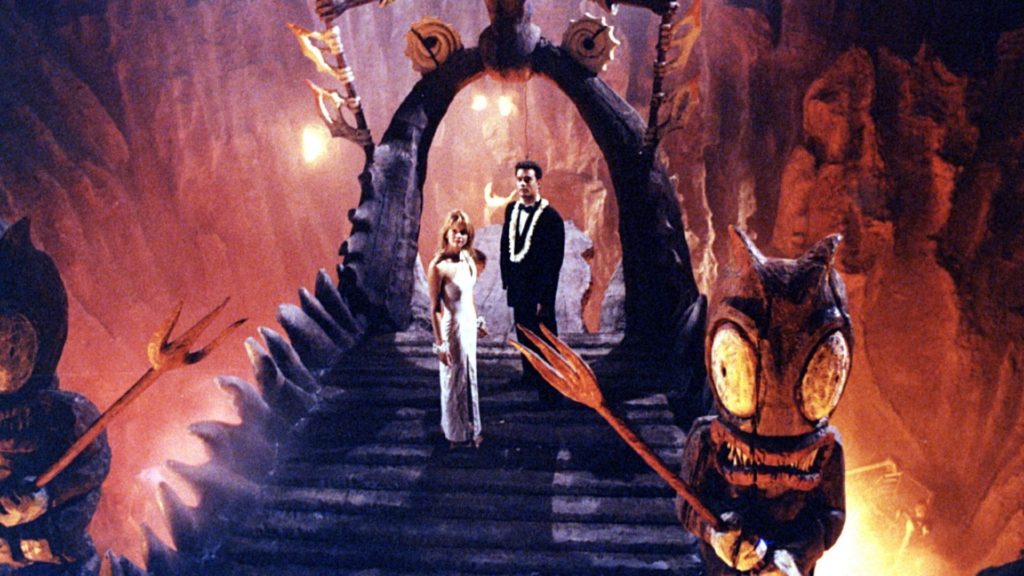"We'll take this leap and we'll see"
We did Joe Versus the Volcano wrong, and, by extension, ourselves wrong. The 1989 film was drubbed by critics as “flat” and a “wan bit of whimsy.” Even with its generous reappraisal over the next three decades, it still sits at only 61% on Rotten Tomatoes. It was actually a modest box office success, but it earned the reputation as a flop. The writer and director, John Patrick Shanley (who earned the gig after winning an Oscar for penning Moonstruck), became Hollywood kryptonite. He didn’t direct another film for nearly two decades.
It’s a damn tragedy of cinema Shanley disappeared, because Joe Versus the Volcano is something special. It’s hard to categorize: a screwball romantic comedy tinged with fantasy and spiritualism, perhaps; a true sui generis triumph. It’s the first of the three legendary pairings of Tom Hanks and Meg Ryan, romcom juggernauts, though even in that manner it’s a surprise: Ryan plays three different characters who serve as romantic partners to Hanks during different phases of his journey, her identity metamorphizing as Joe comes closer to death and enlightenment.

The film opens with Joe Banks (Hanks) entering his soul-sucking, factory-like office and encountering some truly dreary working conditions. This opening is absolutely magnificent; if you had told me Shanley was a playwright who had never directed a film before, I wouldn’t have believed you for an instant. It’s so cinematic.
We follow the employees like worker ants scuttling into a hole. It’s Tati-esque, and almost Expressionistic, crafting a heightened and mutated reality that is borderline dystopian, the sounds and sights grating and dulling Joe’s soul like a high-torque drill stripping a screw. Joe, you see, is always sick and always tired, so he goes to see a doctor to try and find a quick fix.
Instead, the condition is terminal. Banks is diagnosed with “brain cloud” and given six months to live. This terrible news is the catalyst Joe needs. He has a liberating meltdown, quitting his job and accepting a modest proposal from a billionaire (Lloyd Bridges): Become a human sacrifice for the natives of a tiny tropical island filled with valuable minerals so that they will welcome outsiders; and, in exchange, the billionaire will fund his travel and luxurious final days. He’ll be a hero and capitalistic chum, incinerated by volcanic commerce and plumes of dreams.

Joe Versus the Volcano walks a razor’s edge: It is anarchic and exaggerated, but more earnest than wacky, at least until the final half hour where it teeters maybe an inch too far into silliness; just a tiny bit, though. The Waponis, natives of the volcanic island, would not be entirely out of place in Indiana Jones and the Temple of Doom in terms of questionable caricature. I can’t really resent it too much, though: Shanley keeps the damn thing flowing and exciting and introspective.
In spite of the playful, lightly absurdist tone of the film, its central preoccupation is the composition of Joe’s character. It’s a story of a “soul sickness,” the biblical battling with the consumerist: Samson visits a salon to cut his “delicate tangles” yet gains strength; Jonah prays and dances in the belly of a steamer trunk; at a wedding, water is turned to orange soda. It’s all silly and all profound.
Shanley is a playwright by profession, so of course his script is absolutely terrific. The dialogue has a joyful, piercing cadence to it: It’s rat-a-tat, with phrases and words cycling, occasionally pausing for verbal flourishes on unexpected topics. My favorite might be a poetic tribute to luggage by a salesman (Barry McGovern): “If I had the need and the wherewithal, Mr. Banks, this would be my trunk of choice.” After Joe buys four of them, the salesman says farewell: “May you live to be a thousand years, sir.” There’s no better goodbye in the history of the English language.
Shanley’s direction is the equal to his writing, though: The middle act never quite matches the surrealistic heights of the opening and closing, but the camera always places us in unique, oddly-shaped spaces, filled with unexpected people and props. There’s a lamp at Joe’s office that I desperately want to place in my own home office. The aforementioned luggage are things of crystalline beauty despite being so geometrically simple, and they get tremendous play throughout the story.

Shanley occasionally indulges in larger-than-life images that look they come from a picture book or an album cover or a Méliès short: There’s one shot (really two) of the moon that rightfully gets used in all of the marketing, a hazy green pre-storm sky that portends doom and euphoria like the curtains in Vertigo, and a shipwreck straight out of a Looney Tunes gag.
The cast does some terrific work bringing life to the material. Hanks is great as Joe, modulating his neurosis and idealism in a way that fits the material perfectly. It’s no surprise, but still a delight, that he makes the big swings of the story feel plausible so that the fantasy never disrupts the cinematic magic. Ryan is great, too: Even when she talks in a funny voice as meek secretary DeDe, she brings electric chemistry to the screen with Hanks, and pitches her lines exactly on the level of the material. The supporters are grand all around; the one I’ll remember best is Ossie Davis as sage chauffeur Marshall.
What I love most of all about Joe Versus the Volcano is that it never leaves any doubt that Shanley believes in his material, that the only way to make sense of this messed up world is to treat it as equal parts nonsensical and sacred. Pavement mud and sea water and magma run through our human veins. Despite its heightened reality, it is genuinely inspiring. It is great art, the kind of movie that can motivate you to quit your brain-clouding 9-to-5 and pursue your innermost dreams, even if they’re as ludicrous as diving into a volcano.
- Review Series: Tom Hanks
Is It Good?
Exceptionally Good (7/8)
Dan is the founder and head critic of The Goods. Follow Dan on Letterboxd. Join the Discord for updates and discussion.


4 replies on “Joe Versus the Volcano (1990)”
Hey, I was only seven! And I bought the blu-ray!
It is a really fun movie, though I remember it ratcheting down hard, cinema-wise, after leaving the factory; at least until the island (and of course even the island is not as, let’s say, actually creative) it gives up on really striking set design in favor of vastly more quotidian spaces (just location shooting for a lot of it, iirc), and it’s always bugged me about it.
There is, of course, that crazy moon.
Otherwise, very charming stuff–Hanks is great, Ryan is maybe better? (It’s easy to overrate multi-role performances, but anyway she’s really good. “They told you you had a BRAIN CLOUD?”)
I often suspect I am dying of a brain cloud.
I caught a bad case of brain cloud right around when my 5 year old daughter was born. My younger one is 3, and it’s finally starting to clear. It has nothing to do with the constant sleep deprivation I’m sure.
I have no excuse.
“Existing in 2022” seems sufficient explanation.